There’s been a lot of talk, maybe too much talk, about the struggle between the GOP “Establishment” and “Outsiders,” sometimes – but sometimes not – meaning the Tea Party, however defined. There are many fault lines, wheels within wheels, that divide different groups on the Right, but it’s time to clarify the core issue that has people of perfectly conservative temperament and ideology scratching their heads at their own constituents. After all, we’re conservatives: establishments are a good idea, a necessary intersection of tradition and meritocracy, giving undue weight to neither and co-opting dangerous ideas about revolution and radical change. What’s so bad about that?
The answer is a simple one: it’s almost entirely about spending. The current trajectory of American government spending is one in which spending by government in general, and by the federal government in particular, just keeps on growing as a share of the economy, further and further crowding out the space occupied by free private citizens and businesses in the private sector. Worse, much of this happens automatically, without the consent of the governed in any but the most perfunctory way: discretionary spending is designed to grow because budgets are set by using the prior year’s spending as a baseline, and entitlement and public employee benefit spending – which consume a far larger share of spending – grows by itself in the absence of any affirmative legislation to stop it. The federal government has not passed a budget in nearly 1,000 days (President Obama’s State of the Union speech will mark the 1000th), yet spending has continued to grow, and will continue to grow as far as the eye can see – a dramatic change in our country taking place on auto-pilot – unless dramatic action is taken in response to stop it. Jack’s magic beans have nothing on public spending.
And the growth of spending bleeds over into every other issue. Federal spending comes with strings attached, and those strings reduce the independence of the states and burrow the arms of the federal octopus ever further into the area of social policy. Institutions like churches, schools, and hospitals become hooked on federal money, and have to dance the federal tune. Spending gets earmarked and targeted to favored people, businesses and groups, making society less equal and government less ethical. Spending distorts energy markets, housing markets, and markets for higher education, creating bubbles and inefficiency. And that’s before we even get to the metastatic growth of federal regulation. And eventually, runaway domestic spending saps our ability to adequately fund our national defense.
There is general philosophical agreement among both Republicans and conservatives about all of this. Where the fault line lies is in exactly how far we are willing to go to do something about it. Many people who got into politics as good conservatives, and still think themselves good conservatives constrained by the limits of practical possibility, are at a loss when it comes to meaningful ways to tame Leviathan. For reasons, some good (the need to use political power to protect national security, preserve control of the courts and restrain regulatory overreach), some less so, they have thrown in the towel on the central issue of the day. That is who we speak of as the “Establishment.” Others – not always with a sense of proportion or possibility, but driven by the urgency of the cause – seek dramatic confrontations to prevent the menace of excessive spending from passing the tipping point where we can no longer save room for the private sector. They are the Outsiders, the ones challenging the system and its fundamental assumptions. The analogy of a Tea Party is an apt one: the Founding Fathers had much in common with the Tories of their day, but disagreed on a fundamental question, not of principle, but of practical politics: whether revolution was needed to protect their traditional rights as Englishmen from being eradicated by the growing encroachments of the British Crown. As it was then, the gulf between the two is the defining issue of today’s Republican Party and conservative movement.
In short, the real “Establishment” and “Outsider,” “anti-Establishment” or “Tea Party” factions are not about who is conservative or moderate, or who is inside or outside the Beltway or public office, or who has fancy degrees or a large readership/listenership or attends the right cocktail parties or churches, or even necessarily who has or has not supported various candidates. The term “Establishment” is used and abused in those contexts, but invariably describes only a division of passing significance. The real battle between the Establishment and the Outsiders is between those who urge significant changes in our spending patterns as a necessity to preserve the America we have known, and those who are unwilling to take that step. It is, in short, between those who are, and those who are not, willing to take action in the belief that the currently established structure of how public money is spent is unsustainable and must be fixed while it still can if we are not to lose by encroachments the all the other things Republicans and conservatives stand for.
The Background

In a way, the division between confrontation and accommodation with the growth of the public sector is one that dates back to the 1950s, and the historical origins are useful in understanding why National Review, in particular, has found itself caught in the crossfire between its editors and its readership. The great GOP debate of 1933-1956 or so was how to react to the New Deal: try to moderate its excesses, or assault its premises. Dwight Eisenhower, in the long run, won the battle within the party in favor of the former; William F. Buckley, jr., in the long run, won the battle within the conservative movement in favor of the latter (hence the slogan “standing athwart history, yelling ‘stop!'”). Yet even Buckley and his magazine spent more effort combatting the status quo in national security policy than on the size of government.
From Goldwater’s failure in 1964 to Reagan’s victory in 1980 and Newt Gingrich’s victory in 1994 and failure in 1995-96, the common thread has been that conservatives win arguments about cutting taxes and restraining domestic discretionary spending, but lose arguments about dismantling the entitlement state created by FDR and LBJ and the auto-pilot budget-bloating processes of the 1970s. George W. Bush cemented this consensus in 2000-05: he could get the public behind cutting taxes and (sort of) restraining the growth of discretionary domestic spending but couldn’t get the public behind Social Security reform and was only able to get elected in 2000 by promising – then delivering in 2003 – a pricey new Medicare prescription drug entitlement. It seemed at the time that conservatives would have to content themselves with winning battles on taxes, national security, social issues/the courts and occasionally discretionary spending, but couldn’t challenge the status quo on the entitlement state and its compulsory collectivist impulses.
Then we got the multiple whammies of 2006-2011, which collectively pushed a lot of people on the Right from a position of accepting that they might be naive about how much change was possible, to being determined that the Establishment was naive about how long the old system could stand:
1. The Congressional GOP got swamped in the 2006 and 2008 elections, casting doubt on the long-term electoral viability of a strategy of modest ambitions in restraining spending, as well as spotlighting the ethical hazards of co-existing with massive federal spending.
2. The U.S. financial crisis left the federal and state governments in an immediately and visibly horrible fiscal position, bringing a renewed focus to the fact that entitlements (both citizen entitlements and public-employee benefit entitlements) would have brought us to this pass eventually and were only getting worse – a fact that otherwise-moderate public officials like Chris Christie and Mitch Daniels were able to exploit to get significant public support behind rethinking the social contract between government and its employees, if not its constituents.
3. The U.S. fiscal crisis paled in comparison to the fiscal crises of Europe. The horrible position of Greece in particular was a radicalizing event, as observant Americans were presented with a vivid example of how an entitlement state unravels. And the downgrade of the U.S. credit rating in the summer of 2011 cracked the complacency of those who assumed such things could never happen here.
4. More broadly, the financial crisis shook the faith of people throughout American society in our leading institutions, public as well as private. It made many people less trusting of experts, and less easily soothed by appeals to the status quo. The Occupy Wall Street movement, in its own way, underscored the fact that the center was fraying from both sides. The growth in support for Ron Paul is likewise a symptom of this dynamic.
5. Barack Obama got elected and pushed the most dramatic expansion of the universal-entitlement state in memory on healthcare, destroying the illusion that Republicans could hold the line by being reactive and awakening many previously sleepy citizens to the danger of comprehensive, compulsory national policies dictating the details of our daily personal lives.
6. The war – the glue that had held together Bush’s coalition – first turned politically toxic in 2006 and then began to recede in importance, almost immediately after both parties chose their presidential nominees in 2008 primarily on the basis of their positions on the Iraq War. Without the war as a unifying political force, it was no longer possible to convince spending hawks to set their concerns aside for the greater good.
7. The success of some – but by no means all – Tea Party candidates in the 2010 elections laid bare the fact that a lot of voters out there were open to the idea that possibly the whole structure of the federal government’s relationship with the voters was unsustainable.
Ben Domenech offers a helpful graph that sums up the impact:

Confronting Leviathan
Where do we go from here?
Congress

The Establishment vs Outsiders dynamic has manifested itself most clearly in the various battles John Boehner – to his credit, despite being temperamentally and by experience a classic establishment figure himself – has attempted to wage on budget issues, most of which have ended with him surrounded and outmaneuvered by a de facto alliance of the Obama Administration, Harry Reid, and most depressingly Mitch McConnell. A line of battle is only as strong as its weakest link, and Boehner has repeatedly gone into battle without being able to depend on McConnell and the Senate GOP to hold his end of the line, making his negotiating position untenable. For the most part, the House-Senate divide has not been about ideology, but about tactics, and the Senate Republicans simply have not been willing to go as far as the House. This is precisely what I mean by “Establishment.”
The small but determined Outsider faction in the Senate, led by men like Jim DeMint and Ron Johnson, will need reinforcements, and all the moreso if – as discussed below – we end up with Mitt Romney as the GOP nominee and possibly the next President. This is why I have stressed, here and here, the importance of continuing to build a counterweight within Congressional GOP to whatever emerges from the presidential race, in particular unbeholden to Romney, and with particular focus on wresting control of the Senate GOP from its current accomodationist leadership. The results thus far have been mixed, although Jim DeMint’s refusal to endorse a candidate before the South Carolina primary is at least a start.
The White House

The presidential race, of course, has been a great disappointment. Of the remaining five candidates, the two Texans are truly anti-Establishment, but one (Rick Perry) has struggled to get traction and is not (despite his impressive record) a particularly persuasive spokesman, while the other (Paul) is limited by the many other ways in which he is unacceptable to the Right and unworthy of significant office. The two Northeasterners are classic Establishment figures on spending: Mitt Romney’s entire career (like that of his father) embodies the Eisenhower-era approach of accommodation, complete with his signing of a huge, costly new entitlement in Massachusetts; while Rick Santorum is in many ways tempermentally more of a populist outsider, his career ended as part of the Senate leadership that lost its way and then its offices in the run-up to 2006. Both have attracted vocal, overlapping cheering sections dedicated to arguing that the tiger must be ridden. In the middle we have Newt Gingrich, who as I have written before, is a mixed bag on these issues; Newt is a believer in finding less confrontational ways to start unraveling the entitlement state, but he’s not fully a small-government guy, and your view of the weight to be placed on his successes and failures in this area may vary.
The contrast can be illustrated by the responses at last night’s debate by Santorum and Romney to Gingrich’s plan to offer voluntary private accounts as an opt-out of the Social Security system for younger workers. Santorum:
[Newt’s plan is] irresponsible. And I say that against Newt because there’s nobody for the last 15 years that’s been more in favor of personal savings accounts than I have for Social Security. But we were doing that when we had a surplus in Social Security. We are now running a deficit in Social Security. We are now running a huge deficit in this country.
Under Congressman Gingrich’s proposals, if he’s right, that 95 percent of younger workers [choose to opt-out], there will be hundreds of billions of dollars in increased debt, hundreds of billions of more debt being put on the books, which we can’t simply – we’re going to be borrowing money from China to fund these accounts, which is wrong. I’m for those accounts, but first we have to get our fiscal house in order, balance this budget and then create the opportunity that Newt wants. But the idea of doing that now, is fiscal insanity.
Romney:
Rick is right. I – I know it’s popular here to say, oh we could just – we can do this and it’s not going to cost anything. But look, it’s going to get tough to get our federal spending from the current 25 percent of the GDP down to 20, down to 18 percent, which has been our history. We’ve got a huge number of obligations in this country and cutting back is going to have to happen. I know something about balancing budgets.
In the private sector, you don’t have a choice. You balance your budget, or you go out of business. And we – we simply can’t say we’re going to go out and borrow more money to let people set up new accounts that take money away from Social Security and Medicare today. Therefore, we should allow people to have a voluntary account, a voluntary savings program, tax free. That’s why I’ve said anybody middle income should be able to save their money tax free. No tax on interest, dividends or capital gains.
That will get American[]s saving and accomplishes your objective, Mr. Speaker, without threatening the future of America’s vitality by virtue of fiscal insanity.
Santorum and Romney plainly both recognize that Newt’s proposal would be good for younger workers, but Santorum argues that we need to keep them trapped in the current system to pay for other people’s current benefits, which of course is the self-fulfilling cycle that keeps the system impervious to reform. This is the rationale of Romneycare and Obamacare – compelling individuals to subsidize a collective program – and why such programs are so hard to uproot once they have been in place for a while. More crucially, what both Santorum and Romney are missing – both with regard to Santorum’s pleas for delay and Romney’s offering of an alternative savings system on top of Social Security – is that we already owe benefits to current recipients, no matter how we fund them, but an opt-out system would prevent us from accruing further obligations to younger workers who would then be self-financing their retirements, changing the system gradually from a defined-benefit to a more actuarially sustainable defined-contribution system, as most private employers have in the past few decades and as even state and local governments are beginning to realize they must (Romney, surely, would recognize this if he was dealing with a private business). This is the fundamental philosophical argument that needs to be made if we are going to persuade the American people not only that the spending and entitlement crisis is real – something the public is prepared to accept – but also that the GOP has a more sustainable long-term answer to fixing it so it does not recur.
At present, with Romney in the lead, it seems highly likely that whatever the outcome, the 2012 presidential election will be an enormous lost opportunity to educate the American public on the nature of the crisis and build a mandate for confronting it.
The Commentariat
Perhaps even more depressing has been the extent to which conservative commentators in general, and National Review in particular, have seemed eager to join not only the pro-Romney faction but the counterreaction more broadly against the “Outsiders” and their effort to shake the status quo on spending and entitlements. Thus, we get suggestions that Romney as President should raise taxes on the middle class by “lowering the floor for the top tax bracket” and preserve parts of Obamacare within a new comprehensive national system rather “than to have an emotionally satisfying but probably unwinnable fight over repeal per se.” This would be disastrous in many ways, not least symbolically: no federal entitlement program has ever been repealed wholesale, and the fact that a repeal of Obamacare would be shocking to the system is precisely why – in addition to its fiscal impact – it would be such significant progress in beginning to regain control over the system. And even worse than the economic and partisan impact of a GOP-sponsored middle-class tax hike is the extent to which raising taxes is official Washington’s longstanding solution to avoiding facing the spending problem. NR still employs a number of wonderful conservative and/or Republican writers who serve an important purpose in the world of political journalism, but that purpose is no longer the one that many of its readers so clearly want: a sustained and serious voice of resistance to an Establishment that is unsustainable. Which may say a good deal about why RedState’s following has grown apace these last few years: our corps of mostly volunteer contributors generally can’t match the resources and output of NR or The Weekly Standard (which to be fair has never positioned itself as an anti-Establishment outfit), but we’re giving voice to a message a lot of people want and need to hear and act on.
The States

The future, if Washington (in particular the Obama Administration) doesn’t cut off its freedom of movement entirely, lies in the states, in the example of greater or lesser reforms pursued in Wisconsin, Ohio, Louisiana, Florida, Indiana, and to some extent New Jersey (where the problems are worse) and Texas (where there was less to reform). The states can provide models not only on the wonkier question of how to fix government’s finances, but on the far more significant underlying question of how to win and lose battles to persuade the public that meaningful change can wait no longer. The front lines in the states are primarily battles over public employee pensions, but important as those battles are, they are a dress rehearsal for the larger and more bitter fights to come over entitlements.
The specific outlines of those changes will continue to be debated, but the Republican Party will continue to be riven internally by a collision between the Establishment and the Outsiders until we have resolved the fundamental question of whether or not we are truly serious about spending and entitlements. If you know where you stand on those questions, you know which group you belong to.













Join the conversation as a VIP Member